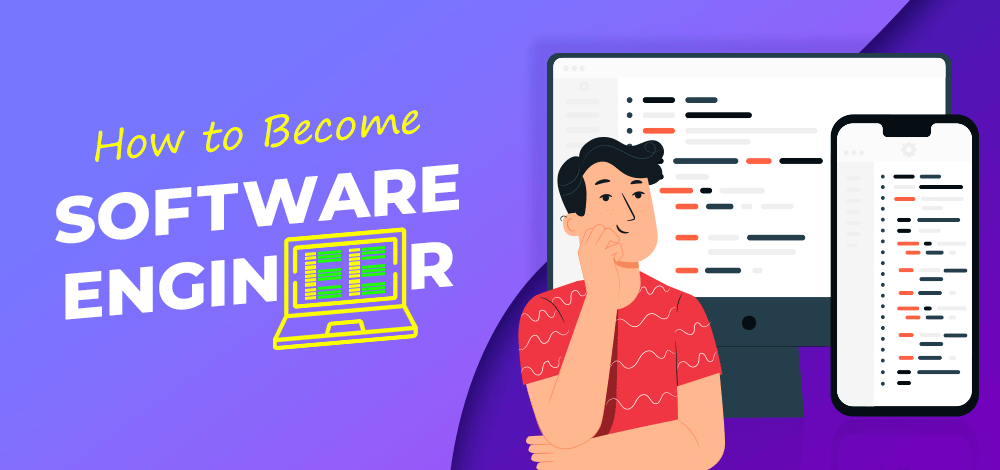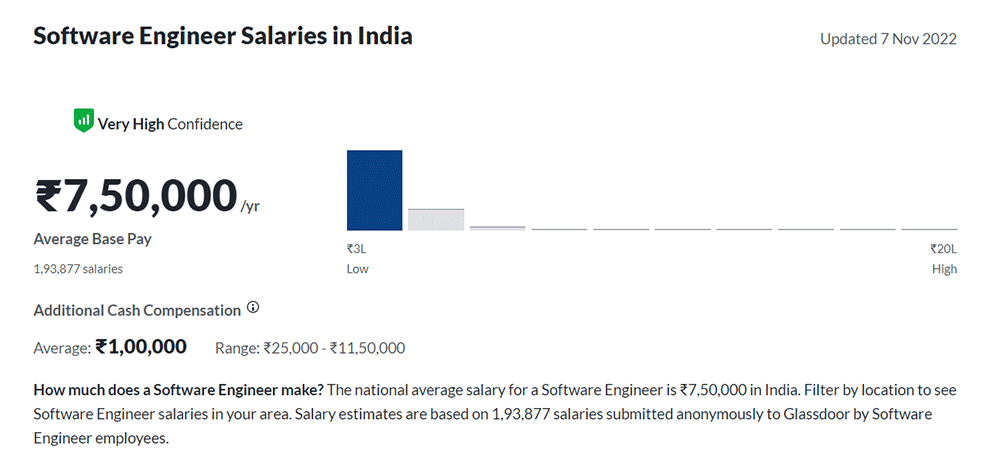Close your eyes for 30-40 seconds, imagine a picture of a programmer and then open your eyes. ….What did you see?
You might have seen a person sitting alone in front of a computer (maybe nerdy) all day in front of a black screen doing some mathematical calculation (sounds boring…??) or you might have pictured someone like Mark Zuckerberg, Sundar Pichai, or Bill Gates.
Whatever you picture in your head you can’t deny the fact that even if a software engineer seems to be a boring person (they aren’t actually), these people are still considered the smartest, most intelligent, and coolest people in the world.

Technology is solving a lot of issues in the world. Thousand of workers’ efforts can be reduced in a company by just introducing software to them. These all are the reasons a lot of people want to become software engineers or developers and they love to help people by building something that can solve their problems.
Table of Content
Software Engineering is one of the highest-paid jobs in the world but you really need a lot of patience, constant learning, and constant improvement in this field.
Average Salary of Software Engineers in India

Image Source: Glassdoor
For newbies, it’s difficult to find out where to start and what would be the best path to become a software developer or engineer. We are going to discuss some options and a general path that will help you to enter this industry as a programmer:
How to Become a Software Engineers – RoadMap 2024
Explore the stage to
1. Pursue Computer Science Related Fields and Degree
This is one of the traditional ways that most students follow to pursue software engineering. A lot of students choose a bachelor’s degree program in computer science, they study in-depth theoretical concepts of computer science subjects which helps them to understand the principle of software engineering.
Data Structures, Algorithms, Web Technology, Computer Networks, Mathematics, Database Systems, Programming Languages, and a lot of major subjects help students to have a comprehensive understanding of software engineering and modern approaches to software development.
A lot of employers set the eligibility criteria of four years bachelor’s degree program in the computer science field so pursuing a degree is a great choice but you shouldn’t rely on a degree only. All those subjects are not going to give you practical exposure or work on real-time projects. You can’t say someone that you have enrolled for the course to become a software engineer until or unless you won’t have practical exposure.
To become a developer or software engineer you need to use your theoretical knowledge and concepts practically working on some real software. You need to showcase your practical skills to the recruiter and we will talk about what you should do apart from theoretical knowledge in the upcoming points.
Note: Pursuing a computer science degree is not compulsory to become a software engineer. You can also join some coding boot camps or online or offline classes to enter programming. These Bootcamps help you to build some basic foundations of computer science fundamentals and help students to build some software to get into the companies for a software developer role.
2. Enhance Programming Languages Skills
Just like people communicate with each other through languages, you also need to tell your computer what to do using a language that these computers can understand. Even if you are a graduate or have a degree it’s not helpful if you don’t have a deeper understanding of any programming language using it to build software. Now you need to take responsibility for your own education so choose any programming language as per your choice and goal and have in-depth knowledge of it.
Ruby, Java, Python, C++, C#, and Javascript are some languages you can go with. It’s not important to learn 3-4 languages simultaneously as a beginner. Start with one language and get well-versed in it. Once you are experienced, you can try your hands at another language. Switching to the next language becomes easier after the first one.
Learn the syntax of the language, practice writing programs in it, and get used to it. Study the libraries, rules, features, advantages, projects that can be built, and other concepts depending on the specific language you choose. You can learn and practice on neveropen.
3. Enhance Data Structures and Algorithms
An algorithm is a step-by-step approach to solving a specific problem, whereas data structure is the way of organizing data. These two concepts help programmers to solve the problem within less amount of time and memory. A software engineer is always expected to give the best solution for a specific problem taking care of time and memory. They should know which algorithm and which data structure will be suitable or the best fit for a certain problem.
Consider an example of searching for an element in a large set of data. You can search the element using a linear search or binary search. Now you need to decide which approach is better (need to take care of time and memory management) to search the data (It depends on the number of data). We highly recommend you focus on these two topics which are the heart of programming. Also, study mathematics if you can, because it helps you to analyze and design the best algorithm for a specific problem.
You can take the help of some portals like GFG, and a lot of sites are there to practice these two essential topics. You will understand how problems are solved in the real world or in industries using these two basic building blocks smartly in software.
4. Enhance Your Skills
Programming is a never-ending journey so your education is not finished when you have completed your degree. It’s true that pursuing a degree helps in understanding the core principle of software engineering but you should know how to implement academic knowledge practically in the real world. You need to keep practicing and you need to keep updating yourself with software updates and new technologies. You should have knowledge of some tools and technologies that are being used in industries.
Browse the StackOverflow site for programming-related queries and to learn from other programmers’ approaches, join some communities where you can discuss and share programming-related stuff, develop connections, attend meetups, watch youtube videos of technical stuff, read technical blogs and use practice sites to build your problem-solving and coding skills.
5. Design and Build Software or Projects
Most employers are going to ask for hands-on experience in building software or a project. Your practical experience is more valuable than your academic knowledge or GPA. Those CS fundamentals and concepts which you have learned in your textbooks, you should know how they can be used in building some amazing software. There is no point to learn all the concepts theoretically if you don’t know how to use them practically. So, use whatever you have learned and improved your skills by building some software or projects.
You can build some personal or professional projects, you can contribute to some open-source projects and you can showcase it to the recruiters putting everything online. Your potential employer will be able to see your skills and experience through your projects.
6. Do Some Internships
Internships are the best opportunity for students to get hands-on industry experience and exposure and that’s the reason it opens a lot of job opportunities. A lot of companies offer internships for students who want to work on industry projects. In internship students’ get practical training and real industry exposure where they work on some projects or products related to their skills, they also learn how to work under a team and it helps them to adapt to the company culture.
Generally, internships are three to six months long for students and we recommend every student go for some internship programs during their college time. Doing an internship can be really helpful in getting a full-time job offer and the same company where you are working as an intern can give you the opportunity for a full-time position once you complete your internship. You can read the link Why Internships are Important for Engineering Students or Freshers? to know its importance.
7. Start Looking For Job Opportunities
If you have done all the above things then it’s time to start looking for job opportunities. Create a resume, create a nice profile on different job portals, post your resume over there, check these websites on a regular basis and apply for the jobs.
Networking really helps in getting some referrals for the job or interviews so make connections, use personal contacts, attend meetups, conferences, and seminars and expand your network. You can also visit different companies’ websites and check the job description in the career option. You can directly apply from their career option as well, if your profile will be shortlisted then the recruiter will approach you for further process.
In order to get a dream job in a company you need to do the right preparation.
But for that, one needs to be guided properly so that the efforts you’d do are on the right track. But still, after completing a degree program of 4 years, many students are not aware of the correct approach or roadmap to crack interviews. But no worries, for such students GFG has come up with a Complete Interview Preparation Course which is a complete package and will help you to crack the interview of any product or service-based company.
The neveropen Complete Interview Preparation Course is an interview-centric course that will help you to crack the coding interviews of top product-based companies without any hassle. Whether you are a college student, experienced, or anyone preparing for an interview, this course will give you everything you want. In this course, you will get a chance to learn various things, such as:
- Programming Languages
- OOPs Concepts
- Master DSA for basic to advanced
- Concepts of Object-Oriented Analysis and Design (OOAD)
- Computer Science Subjects
- Aptitude and Reasoning
- Resume-building tips and hacks
- Help in building high-quality projects
Different Types of Careers in Software Engineering:
Software engineering is a vast field and has different roles based on requirements and task complexity. So you can choose as per your convenience and go ahead. Some of the prominent roles are listed below:
- Full Stack Engineer
- Front-End Engineer
- DevOps Engineer
- Back-End Engineer
- Software Engineer in Test
- Data Engineer
- Embedded Systems Software Engineer
- Security Engineer
- Cloud Engineer
Conclusion:
So these were the skills that you can learn in order to become a Software Engineer as these will help you to shape your career accordingly by giving clarity about your goals and shaping your future properly. Hence, choose the course wisely according to your interest in order to have a great career ahead.




